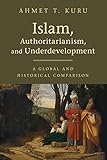Islam, Authoritarianism, and Underdevelopment: A Global and Historical Comparison
Material type: TextPublisher: New York: Cambridge University Press, 2019Description: 303 p., 24 cmISBN:
TextPublisher: New York: Cambridge University Press, 2019Description: 303 p., 24 cmISBN: - 9781108409476
| Item type | Current library | Call number | Status | Date due | Barcode | |
|---|---|---|---|---|---|---|
 Books
Books
|
Netherlands-Flemish Institute in Cairo (NVIC) Library Main Library - 0.01 | B 1505 (Browse shelf(Opens below)) | Available | B 1505 |
Includes bibliographical references and index.
"This book employs comparative historical methods while comparing certain periods of Islamic history with each other as well with particular periods of Western European history. One method it uses is "process tracing," which traces the causes of change by dividing a historical process into smaller and analytically comparable periods. The book also uses the methodological tool of "path dependence" to examine how ideational and material conditions in particular historical periods, especially "critical junctures," shape subsequent conditions by creating a path dependence. For example, in order to examine currently low levels of literacy in Muslim societies, the book traces the historical origins of this problem to these societies' three-century-long delay in establishing printing presses. Muslim societies did not take advantage of the printing technology during and even after the critical juncture of the mid-fifteenth century, when first presses were established in Western Europe. This historical experience created a path dependent literacy gap between Muslim and Western European societies"-- Provided by publisher.
There are no comments on this title.
